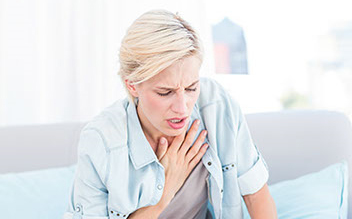
Chronic Obstructive Pulmonary Disease (COPD) is a broad term for smoking-related
lung disease that may lead to shortness of breath, cough and wheezing. The damaged
lungs of COPD patients can make breathing difficult and limit activity.
COPD is often a mix of two diseases: chronic bronchitis and emphysema. In chronic
bronchitis, inflammation occurs in the bronchial tubes. The inflammation narrows these
tubes, making it difficult to breathe. Some people with chronic bronchitis may also have
a persistent cough that brings up mucus.
In emphysema, lung tissue and the tiny air
sacs at the end of the airways in the lungs are damaged. When these sacs are
damaged, air is trapped in the lungs, leading to shortness of breath.
© Copyright 2019 Powered by Carolina Pulmonary & Sleep Clinic. All Rights Reserved.